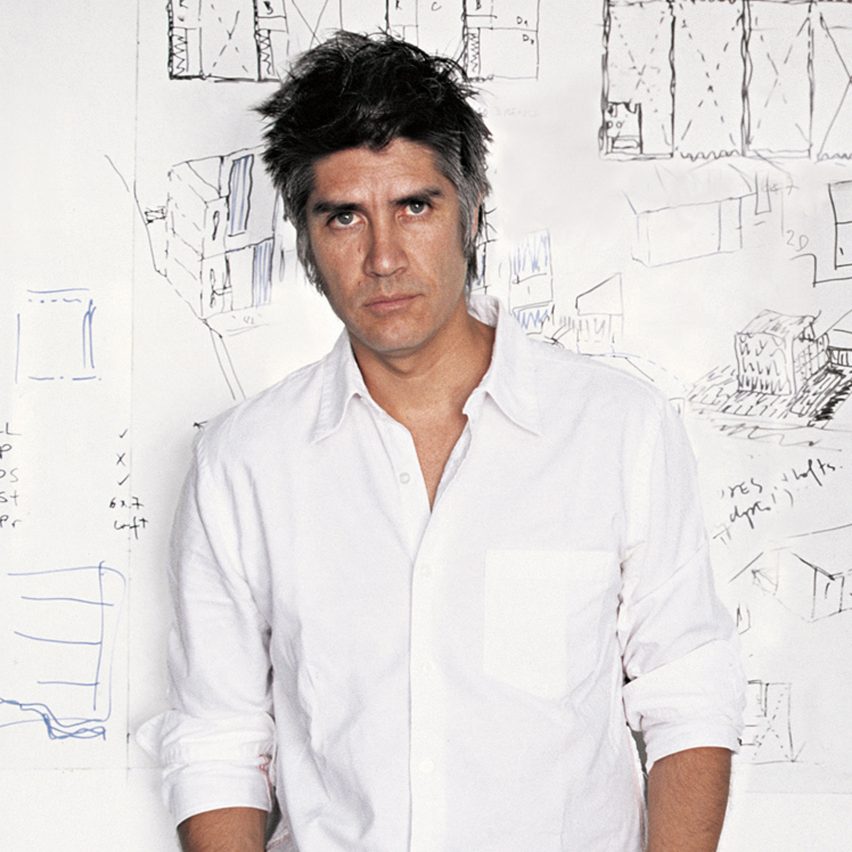
Elemental ends internships amid growing row over unpaid work in architecture studios
Chilean architecture studio Elemental, led by Pritzker Prize winner Alejandro Aravena, has announced it is ending internships after getting caught up in a row about the practice of unpaid labour in architecture.
Elemental wrote to Dezeen today to announce the decision, saying that "given the current state of the debate … we have decided to close our internship positions."
Elemental "could not afford to pay" its interns
In its email the studio, which has built a reputation for socially aware design and innovative affordable-housing solutions, set out its reasons for hiring unpaid interns in the past.
"Knowing that we could not afford to pay the interns, we suggested candidates to apply to scholarships in their country of origin, and many students came with grants for such professional training purposes," it wrote.
"Following these conditions we have had more than 150 interns, with an average ranging from three to five at a time."

The studio complained that Dezeen had failed to contact the studio when reporting claims of unpaid internships at the firm in a recent news story. In fact, Dezeen submitted questions via the architects' contact page last week.
Campaign against unpaid labour in architecture gathers pace
Elemental was one of the first architects named by designer Adam Nathaniel Furman in his #archislavery campaign on Instagram to tackle unpaid internships in the profession.
His campaign hit the news this week after it emerged that Serpentine Pavilion architect Junya Ishigami was offering unpaid positions. Yesterday the Serpentine Gallery ordered Ishigami to use only paid employees on the project.
In its email to Dezeen, Elemental defended its internships, saying it felt they provided "a fair exchange [of] time for experience" and that interns could gain experience of designing social housing that they couldn't get at university.
Following a survey of past interns in 2015 the studio said it had made improvements, such as providing medical insurance and improvements to the shared workspace.
However the studio said it was ending internships in order to protect its professional reputation.
Elemental focuses on socially responsible design
Based in Santiago, Elemental is renowned for its socially driven architecture. Projects include the Qunita Monroy affordable housing project, which provides residents with a shell they can later add to themselves.
In 2016 Aravena directed the Venice Architecture Biennale and was awarded the Pritzker Prize for Architecture the same year. Following the honour, he released plans for several of his housing projects free to the public as open-source designs.
Photography is by Cristobal Palma.
Here is the letter from Elemental in full:
From the very beginning of Elemental, we decided to open our office so that students could experience and learn from a practice and an approach specially to social housing, that we ourselves did not have the chance to go through while at university and that we observed was still pretty much the case in the schools of architecture around the world.When we organised the Elemental International Social Housing Competition back in 2003, we divided it in a professional and a student section.
In order to run that competition, we had to raise funds and we considered money to bring the student winners to Chile, offering them air ticket, a place to stay and food, in the understanding that being part of something that was new, was a fair exchange: time for experience.We then decided to continue the sharing of our approach to deliver social housing through an internship program.
Knowing that we could not afford to pay the interns, we suggested candidates to apply to scholarships in their country of origin, and many students came with grants for such professional training purposes. Following these conditions we have had more than 150 interns, with an average ranging from 3 to 5 at a time.
Part of the requirements were to stay in Chile for 4 months; this because it takes time for us to transfer our knowledge to an intern and develop a common working language.Some years ago we had a situation with an applicant that asked about the payment for the internships and the person in charge at the time, gave an answer that did not reflect our beliefs, not in the tone, nor in the reasoning. Given the fundamental differences, we had to ask that person to resign.
In 2015 we made a survey among past interns. We wanted to know how their experience had been, what would they change and their overall evaluation of their time in our office which resulted in 8 out 10 (10 being the best).
Following the results of the survey, we implemented changes to improve the interns experience such as food, medical insurance, a quality workspace for everyone. As a sample, here [is] a link to the testimony of Anastassia, [in an] article that came to our knowledge just recently.
The current online debate is generalising under the term "un-paid internships" to the point that it has referred to them as exploiting students.
We don't agree with any kind of exploitation nor do we agree with media and people making echo of generalised accusations.
Actually your article made the accusation first and then closes saying that our office will be contacted. Had you done that first you would have received this explanation. We believe this way to proceed should have been the minimum standard for a professional and responsible journalism practice. As of today, March 27th, two days after the article was published, we still haven’t been contacted by Dezeen.
But given the current state of the debate, which is not willing to acknowledge the different intentions behind our initiative and being our professional reputation (which comes from our professional integrity) the only thing we have and something we intend to protect, we have decided to close our internship positions.
We have posted this reply on the comment section on the article as well.
Alejandro Aravena
Gonzalo Arteaga
Juan Cerda
Víctor Oddó
Diego Torres
ELEMENTAL